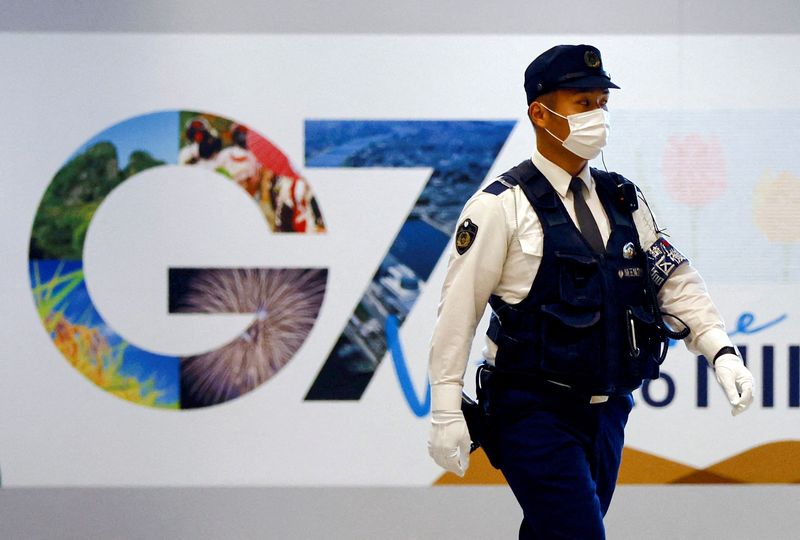TOKYO (Reuters) – Leaders of seven of the world’s richest nations meet next week at the G7 summit in the Japanese city of Hiroshima to discuss geopolitical, economic and climate issues as the war in Ukraine drags on and tensions rise between China and the United States.
WHAT IS THE G7 SUMMIT?
The G7 is an informal grouping of wealthy Western nations. It has no permanent secretariat or legal status. Each year, a different member country assumes the presidency of the group, sets priorities and organises a leaders’ summit and ministerial meetings throughout the year.
Italy will take over the presidency from Japan in 2024. Russia was included in what became the G8 in 1997 but was suspended in 2014 after annexing Crimea from Ukraine.
WHEN AND WHERE IS IT?
This year’s meeting will be held from May 19-21 in Hiroshima, Japan, which in 1945 was the first city to be bombed with an atomic weapon.
WHO IS ATTENDING?
The G7 comprises the United States, Britain, Canada, France, Germany, Italy and Japan. Representatives from the European Union also attend.
In recent years it has become customary to invite other nations to help bring to the fore key topics.
This year, the leaders of Australia, Brazil, Comoros for the African Union, Cook Islands for the Pacific Forum, India, Indonesia, South Korea and Vietnam are among those invited.
The G7 and other Western states are seeking to shore up alliances, reach out to the Global South and defend their shrinking influence as China and Russia make economic inroads and push an alternative to the existing international order.
HOW LONG HAS THE G7 BEEN AROUND?
The G7 was founded following the 1973 OPEC oil embargo as a forum for the richest nations to discuss global economic issues. Its countries have a combined annual GDP of $40 trillion – just under half the world economy.
FROM RUSSIA, CHINA TO NUCLEAR: WHAT’S ON THE AGENDA?
The G7 will hold broad discussions on climate change, the health of the global economy, inflation and global food security as they assess the impact of the Ukraine war.
SUPPORTING UKRAINE
More than a year after Russia invaded Ukraine, the conflict will take centre stage.
The G7 will want to show unity ahead of a likely Ukraine counter-offensive, underscoring the need for more weapons deliveries, political support and financial assistance. How much help the G7 is willing to provide in the coming months will play a large part in determining how the conflict pans out.
That will be coupled with promises to intensify sanctions, and in the immediate term a focus on forcing countries which help Moscow circumvent sanctions to comply with them.
But behind the scenes the G7 countries differ in their approaches to issues such as how and when to bring both sides to the negotiating table, China’s role and whether to ban exports to Russia.
Ukrainian President Volodomyr Zelenskiy will address the G7 via video link.
DETERRING CHINA
The United States has been pushing its closest allies for a stronger deterrence strategy towards China.
The G7 in Japan will be the forum to define that, and from Washington’s perspective to allay doubts among some allies on how to slow China’s technological advance, reduce the West’s economic and supply chain dependency on it, and counter Beijing’s belligerence towards Taiwan.
NUCLEAR NON-PROLIFERATION
Japanese Prime Minister’s Fumio Kishida’s symbolic choice of Hiroshima, his hometown, as host location highlights his desire to put nuclear disarmament and non-proliferation at the top of this year’s agenda.
The post-World War Two nuclear security architecture is being shaken by Russia’s veiled warnings it could use tactical nuclear weapons in Ukraine, North Korea’s repeated ballistic missile tests and Iran’s expansion of its nuclear programme.
“I can’t say that the G7 will resolve these non-proliferation crises, but without a coherent position from the G7 we have no chance,” said a senior G7 diplomat.
ARTIFICIAL INTELLIGENCE
Not originally on the agenda, the rapid ascendancy of generative artificial intelligence (AI) chatbot ChatGPT has meant G7 leaders could no longer ignore it.
In April, Kishida met the CEO of OpenAI, which developed the ChatGPT service, and EU lawmakers urged G7 leaders to find ways to control its development.
G7 digital ministers agreed in April they should adopt “risk-based” regulation on AI.
QUESTIONS FOR BIDEN
The allies will no doubt quiz U.S. President Joe Biden over how serious the risk is of a debt default by the world’s biggest economy. Biden said on May 9 he could cancel his trip if the debt ceiling talks went down to the wire.
Underscoring differences amongst the group, European Union partners will want to bring up the U.S. Inflation Reduction Act, passed last year, which offers $369 billion of green subsidies that often only apply to products made in North America.
The EU fears an exodus of European industry.
(Reporting by John Irish; Editing by Catherine Evans)
